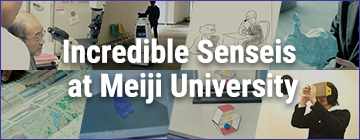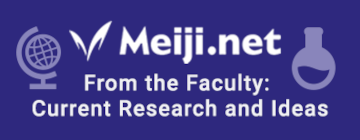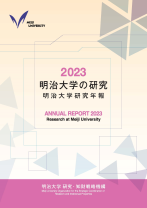【MUIIBR】Appearance by Professor Nagashima at the “iPS Cells and Medicine of the Future” symposium
Apr. 01, 2017



On March 6 (Mon.), the Center for Stem Cell Biology and Regenerative Medicine at The Institute of Medical Science, The University of Tokyo (IMSUT) hosted a symposium titled “iPS Cells and Medicine of the Future” in Hongo, Tokyo. Professor Hiroshi Nagashima of the School of Agriculture at Meiji University was invited to give a lecture.
Speakers at the symposium included Professor Shinya Yamanaka, Director of the Center for iPS Cell Research and Application, Kyoto University, which co-hosted a symposium with Meiji University in July 2015, and Professor Nagashima. Additional speakers included Professor Hiromitsu Nakauchi, Director of the Center for Stem Cell Biology and Regenerative Medicine, IMSUT, who is engaged in joint research and collaboration with Professor Nagashima (Professor Nakauchi is currently also engaged in research in the United States as a professor at Stanford University) as well as researchers from four other institutions. The symposium drew an audience consisting of many researchers, clinicians, students, and members of the general public, who filled the venue and engulfed it in an atmosphere of enthusiastic interest.
The symposium began with opening remarks by Yoshinori Murakami, Dean of IMSUT, on behalf of the host. He was followed by Professor Yamanaka, who spoke on the future of iPS cells and the outlook for their application in regenerative medicine and new drug development. Following this, Professor Nakauchi talked on topics such as the establishment of human iPS cells with chimera-type capabilities and other subjects. Next, Professor Nagashima took the podium and delivered a lecture that focused on regenerative medicine research using pigs as platforms. He presented information on the latest research on application for treatment of intractable and refractory diseases such as muscular dystrophy and diabetes.
As Director of the Research Extension and Intellectual Property Headquarters and Representative of the Meiji University International Institute for Bio-Resource Research as well as being a pioneer in the field of reproductive biology, Professor Hiroshi Nagashima has been leading such research activities at Meiji University. He has been actively engaged in research activities, as evidenced by his receipt of a research grant from the Japan IDDM network, a specified non-profit organization (Saga-shi, Saga) supporting patients with Type 1 diabetes mellitus, in November 2016. This grant is based on the “Bio-Artificial Pancreatic Islet Transplantation Project” supported by this organization. At present, people with diabetes reportedly number about 422 million worldwide (reported by the World Health Organization in April 2016). With an earnest attitude and passionate spirit, Professor Nagashima is working toward the goal of establishing a method of treatment for this disease, and said that “I want to bring the technology up to a level permitting practical application my tenure at Meiji University.” Parties outside Meiji University have likewise expressed high ratings and expectations of his research. An IMSUT researcher, for example, stated that “the research on regenerative medicine conducted by Professor Nagashima using pigs was indisputably world-class research.”
Research such as these are bright signs to people struggling with intractable and refractory diseases. They are anticipated to play an important role in social contribution from the aspect of research activities at universities. There are high hopes for the future progress of research along with the establishment of laws concerning medical and ethical issues in society.
Speakers at the symposium included Professor Shinya Yamanaka, Director of the Center for iPS Cell Research and Application, Kyoto University, which co-hosted a symposium with Meiji University in July 2015, and Professor Nagashima. Additional speakers included Professor Hiromitsu Nakauchi, Director of the Center for Stem Cell Biology and Regenerative Medicine, IMSUT, who is engaged in joint research and collaboration with Professor Nagashima (Professor Nakauchi is currently also engaged in research in the United States as a professor at Stanford University) as well as researchers from four other institutions. The symposium drew an audience consisting of many researchers, clinicians, students, and members of the general public, who filled the venue and engulfed it in an atmosphere of enthusiastic interest.
The symposium began with opening remarks by Yoshinori Murakami, Dean of IMSUT, on behalf of the host. He was followed by Professor Yamanaka, who spoke on the future of iPS cells and the outlook for their application in regenerative medicine and new drug development. Following this, Professor Nakauchi talked on topics such as the establishment of human iPS cells with chimera-type capabilities and other subjects. Next, Professor Nagashima took the podium and delivered a lecture that focused on regenerative medicine research using pigs as platforms. He presented information on the latest research on application for treatment of intractable and refractory diseases such as muscular dystrophy and diabetes.
As Director of the Research Extension and Intellectual Property Headquarters and Representative of the Meiji University International Institute for Bio-Resource Research as well as being a pioneer in the field of reproductive biology, Professor Hiroshi Nagashima has been leading such research activities at Meiji University. He has been actively engaged in research activities, as evidenced by his receipt of a research grant from the Japan IDDM network, a specified non-profit organization (Saga-shi, Saga) supporting patients with Type 1 diabetes mellitus, in November 2016. This grant is based on the “Bio-Artificial Pancreatic Islet Transplantation Project” supported by this organization. At present, people with diabetes reportedly number about 422 million worldwide (reported by the World Health Organization in April 2016). With an earnest attitude and passionate spirit, Professor Nagashima is working toward the goal of establishing a method of treatment for this disease, and said that “I want to bring the technology up to a level permitting practical application my tenure at Meiji University.” Parties outside Meiji University have likewise expressed high ratings and expectations of his research. An IMSUT researcher, for example, stated that “the research on regenerative medicine conducted by Professor Nagashima using pigs was indisputably world-class research.”
Research such as these are bright signs to people struggling with intractable and refractory diseases. They are anticipated to play an important role in social contribution from the aspect of research activities at universities. There are high hopes for the future progress of research along with the establishment of laws concerning medical and ethical issues in society.





